All Car Segments Types In India Explained With Examples
In this article, we’ll explain the car segments in India with examples. There are 4 main segments in India - A, B, C and D. Among these, we further have 2 sub-segments each in B, C and D class. This length-based vehicle segmentation also includes the list of body-styles available in each segment. This article also factors in the new C-segment sedans, which are getting long enough to qualify to be part of the D segment. Let’s start with the smallest in the group, A-segment cars.
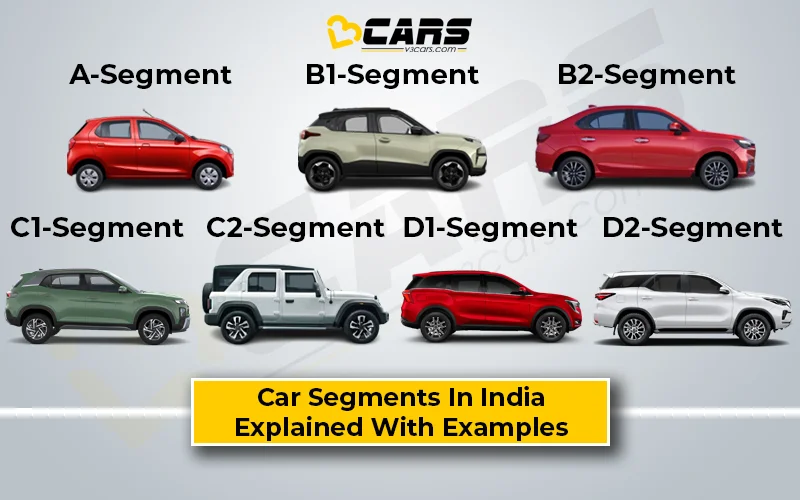
A Segment
The A segment is the smallest category of cars, with a length of less than 3699mm. These cars are typically compact, affordable, and great for navigating through city traffic. The predominant body style in the A segment is hatchback but you can also get micro SUV style cars like Maruti Suzuki S-Presso and Renault Kwid.
Examples of A Segment Hatchbacks: Maruti Suzuki Alto K10, Renault Kwid, and Maruti Suzuki Celerio, Maruti Suzuki S-Presso, etc.
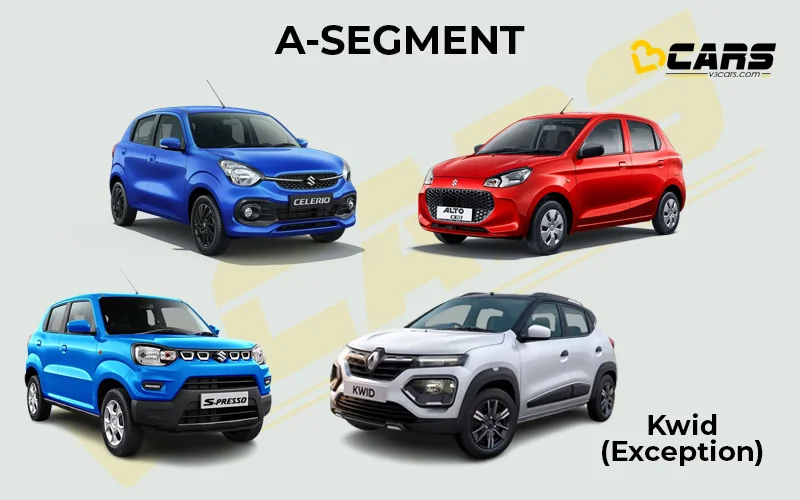
It’s worth noting that the Kwid here is an exception. It technically has the length to be in the B segment but because of its overall size, features and performance, it serves better as an alternative to the A segment cars like the S-Presso, Alto and Alto K10.
B Segment
The B segment includes cars that are slightly larger than the A segment, with a length ranging from 3700 to 3999mm. These cars are still compact and affordable, but often offer more features and a bit more space. Most B-segment cars come with either a 1.0L turbo petrol engine or a larger 1.2L petrol engine for better performance. Some B-segment hatchbacks, such as the Tata Punch EV, also come with an electric motor.
B1 Segment
The B1 segment includes cars with a length ranging from 3700 to 3849mm. Examples of B1 segment cars include the Maruti Suzuki Ignis, Hyundai Grand i10 Nios, Tata Tiago and Tata Punch.
Examples of B1 segment hatchbacks: Tata Tiago, Tiago EV and Tiago NRG, Hyundai Grand i10 Nios, Maruti Suzuki Ignis, Tata Punch and Punch EV, etc.
Note: Check your car’s fuel cost with Fuel Cost Calculator India
B2 Segment
The B2 segment includes cars with a length ranging from 3850 to 3999mm. Examples of B2 segment cars include the 2024 Maruti Suzuki Swift, Tata Altroz, Maruti Suzuki Baleno, Honda Amaze, Hyundai Venue, Kia Sonet, and the new Mahindra XUV 3XO.
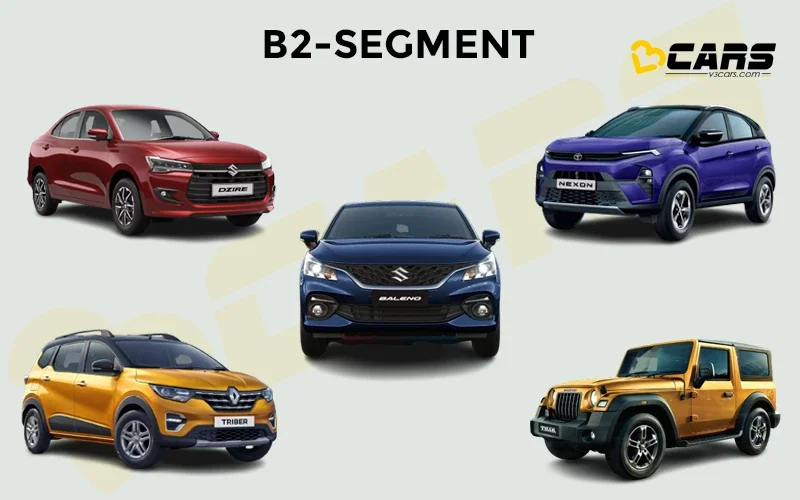
Because of the tax structuring in India, most B2-segment cars offer a maximum of 1.2L displacement for petrol engines or 1.5L displacement for diesel engines. 1.0L turbo petrol engines are also common in B2 segment cars. These offer far better performance while allowing the car to qualify for the small-car tax slab.
In this segment, hatchback, sedan, MPV and SUV body styles are available.
Examples of B2 segment hatchbacks: Maruti Suzuki Baleno, Tata Altroz, Maruti Suzuki Swift, etc.
Examples of B2 segment sedans: Maruti Suzuki Dzire, Tata Tigor, Honda Amaze, Hyundai Aura, etc.
Examples of B2 segment MPVs: Renault Triber
Examples of B2 segment SUVs: Maruti Suzuki Fronx, Toyota Urban Cruiser Taisor, Tata Nexon and Nexon EV, Maruti Suzuki Brezza, Skoda Kylaq, Maruti Suzuki Jimny, Mahindra Thar, Force Gurkha 3 Door, etc.
Note: The Maruti Suzuki Jimny, Mahindra Thar and Force Gurkha 3 Door don’t fully qualify for the small-car tax slab because of their larger engine displacements. Only the Thar 2WD with its 1.5L turbo diesel engine meets the small-car requirements.
ADAS features like adaptive cruise control, collision avoidance and others are common in the higher variants of B2-segment cars.
Also Read: Driving Licence Validity And Renewal In India
Note: Check your Car EMI with our - Car Loan EMI Calculator
C Segment
The C segment includes cars that are larger than the B segment, with a length ranging from 4000 to 4599mm. These cars are typically more spacious, comfortable, and come loaded with features. C segment cars in India include the Kia Seltos, Hyundai Creta, Skoda Kushaq and Hyundai Verna, Honda City, Skoda Slavia, Nexa XL6 and Kia Carens.
1.5L normal petrol, 1.0L turbo petrol and 1.5L turbo petrol engines are pretty common in this segment. You can even find some cars with 1.5L turbo diesel engines in this class like the Carens, Creta, Alcazar and Seltos.
C1-Subsegment
The C1 segment includes cars with a length ranging from 4000 to 4399mm. C1 segment cars sold in India currently offer 1.0L turbo petrol, 1.5L normal petrol, 1.5L petrol-hybrid, 1.5L turbo petrol, 1.5L diesel or an electric motor.
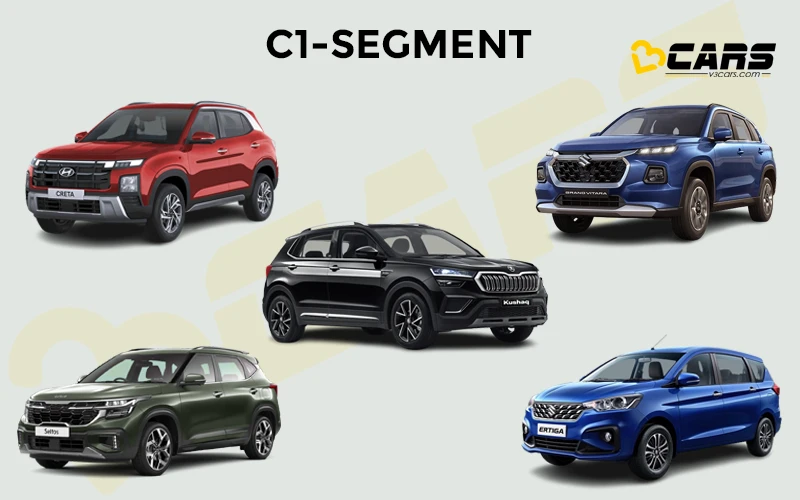
Examples of C1 segment SUVs: Skoda Kushaq, Volkswagen Taigun, Citroen Aircross, Hyundai Creta, Kia Seltos, Maruti Suzuki Grand Vitara, Tata Curvv EV, etc.
Examples of C1 segment MPVs: Maruti Suzuki Ertiga
Since these cars breach the 4-metre mark, they have to include high tax in their ex-showroom prices. So, they are considerably more expensive than the smaller B2-segment cars. Manufacturers also know this quite well and therefore, offer much larger vehicles in this segment. This way, the car buyers get a much bigger vehicle than a B2-segment car and the cars mostly justify the price jump with far better road presence.
The only exceptions to this rule are the Kushaq and Taigun. These C1 segment cars are considerably smaller than the other C-segment cars like the Creta, Grand Vitara and Seltos. The most common body style you will get in the C1 segment is SUV.
C2 Segment
The C2 segment includes cars with a length ranging from 4400 to 4599mm.
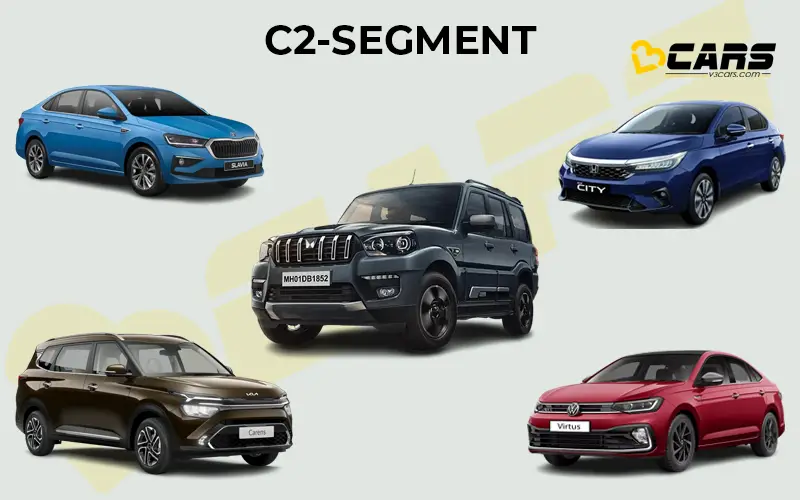
Examples of C2 segment sedans: Honda City, Maruti Suzuki Ciaz, Hyundai Verna, Skoda Slavia, Volkswagen Virtus, etc.
Examples of C2 segment SUVs include: Hyundai Alcazar, Mahindra Thar Roxx, Mahindra Scorpio Classic, Jeep Compass, etc.
Examples of C2 segment MPVs include: Maruti Suzuki XL6, Kia Carens, etc.
D Segment
The D segment includes cars that are even larger than the C segment, with a length of 4600mm or longer. These cars are typically more luxurious, powerful and offer plenty of space for passengers and luggage. D-segment cars are best suited for buyers who want to travel in the rear seat. However, some of the D-segment cars are also enjoyable to drive like the XUV700, Scorpio N and Tata Safari.
D1 Segment
The D1 segment includes cars with a length ranging from 4600 to 4799mm.
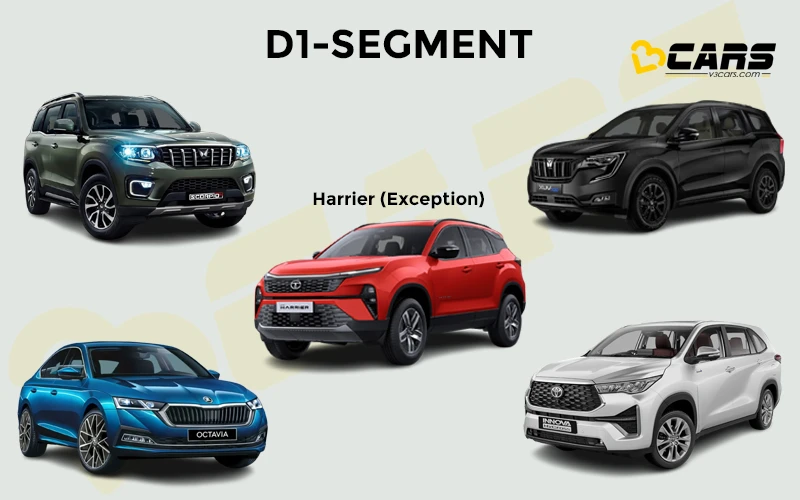
Examples of D1 segment SUVs include: Mahindra XUV700, MG Hector and Hector Plus, Tata Safari and Harrier
Examples of D1 segment MPVs include: Toyota Innova Hycross and Innova Crysta
Examples of D1 segment sedans include: Audi A4, Mercedes-Benz C-Class, BMW 3 Series, etc.
The D1 segment is also home to luxury EVs such as the Hyundai Ioniq 5 and the Kia EV6.
D2 Segment
The D2 segment includes cars with a length over 4800mm. The most common cars in the D2 segment are SUVs, but you can also find luxury sedans and MPVs if you prefer their bodystyles.
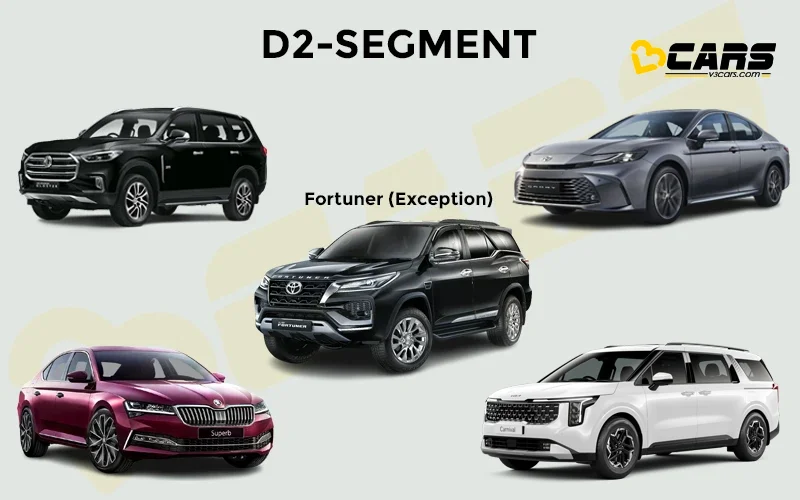
Examples of D2 segment sedans include: Skoda Superb, Toyota Camry, BYD Seal
Examples of D2 segment SUVs include: Toyota Fortuner, MG Gloster, Jeep Wrangler, etc.
Examples of D2 segment MPVs include: Kia Carnival, Toyota Vellfire, Lexus LM, etc.
Unless you go for lifestyle pickup trucks like the Isuzu D-Max V Cross or Toyota Hilux, most of the D2-segment cars are suitable for rear seat usage. The common body styles for D2 segment cars are sedan, SUV, MPV and pickup truck.
Note: Check your car’s fuel cost with Fuel Cost Calculator in India
Car Segments In India - Summary
Here’s a quick recap of the length-based segments of car in India with their respective body styles and vehicle examples:
Also Read: How To Find Tata Vehicle Manufacturing Date With VIN Number?
Note: Check your Car EMI with our - Car Loan EMI Calculator

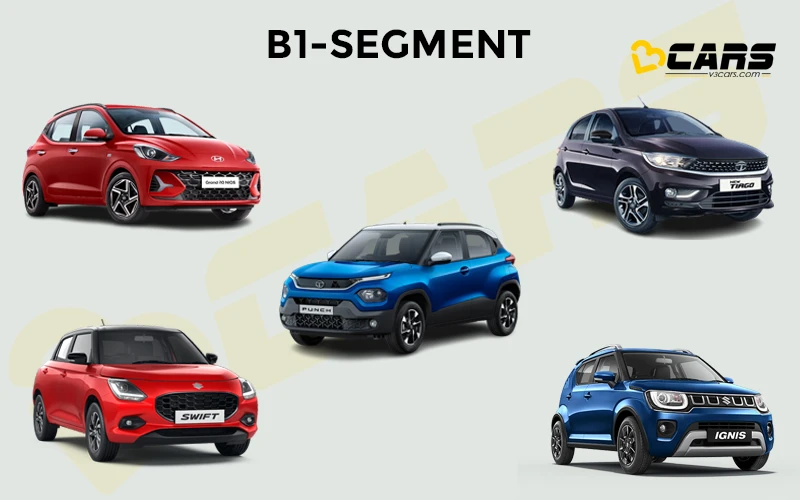

Dear Mahesh, the data has been aptly tabulated for easy understanding. I just loved it.